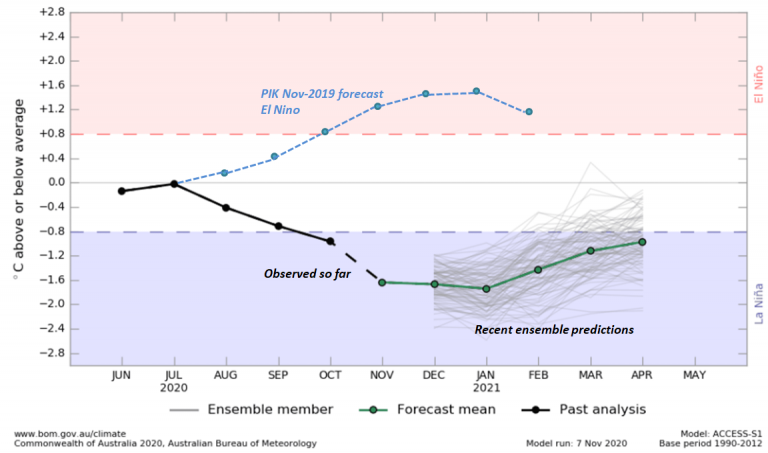Last year Germany’s Potsdam Institute (PIK) boasted that it had a superior El Niño one-year forecasting model, claiming 80% certainty. Today, a year later, its forecast emerges totally wrong and the prestigious institute is left humiliated.
In 2019, Germany’s Potsdam Climate Institute (PIK) boasted that it had a superior El Niño forecasting model, claiming one year in advance and with 80% certainty, there would be an El Niño event late in 2020 (upper curve is just an El Niño illustration). But the PIK model forecast flopped totally. The opposite has in fact emerged. Chart source: BOM (with additions).
One year ago, together with researchers of the Justus Liebig University Giessen (JLU), and Bar-Ilan University in Ramat Gan in Israel, Germany’s alarmist yet highly regarded Potsdam Institute for Climate Research (PIK) boldly declared in a press release there would “probably be another ‘El Niño’ by the end of 2020.”
PIK even boasted forecast model superiority
The PIK November 2019 press release bragged that its team of researchers had developed a new, far better model – which they said was capable of forecasting a late 2020 El Niño event a year in advance: “The prediction models commonly used do not yet see any signs of this,” the PIK press release wrote.
The PIK press release then called the early forecasting model approach “groundbreaking”, claiming it was based on a “novel algorithm” developed by its team. Their forecast relied “on a network analysis of air temperatures in the Pacific region and which correctly predicted the last two ‘El Niño’ events more than a year in advance.”
The results were even published in a journal: https://arxiv.org/abs/1910.14642
“Conventional methods are unable to make a reliable ‘El Niño’ forecast more than six months in advance. With our method, we have roughly doubled the previous warning time,” stressed JLU physicist Armin Bunde, who initiated the development of the algorithm together with his former PhD student Josef Ludescher.
John Schellnhuber: “80% certainty”…”pretty significant”
Prof. Hans-Joachim (John) Schellnhuber, Director Emeritus of PIK, explained: “This clever combination of measured data and mathematics gives us unique insights – and we make these available to the people affected.” He pointed out that, of course, the prediction method did not offer one hundred percent certainty: “The probability of ‘El Niño’ coming in 2020 is around 80 percent. But that’s pretty significant.”
The 20% uncertainty ends up humiliating PIK physicists
Using data from the past and with the help of of their algorithm, the PIK scientists said El Niño events could then be “accurately predicted the year before”.
Today, one year later, in November 2020, we see that the opposite is in fact occurring, see chart above. Now the equatorial Pacific is entering a La Niña event instead of the almost certain El Niño claimed earlier by the now embarrassed PIK researchers.
Can’t even get one climate component over a single year right
The PIK’s “high certainty” forecast misses totally and so underscores the risks and pitfalls of being overconfident when it comes to still poorly understood complex systems.
And if scientists struggle predicting just one single regional component of the entire climate for just one year, then imagine what the reliability of their complete climate system predictions going out decades has to be. GIGO!






How can those clowns pretend to know what will be the climate in 2100 if they are not even able to predict the next ENSO sign ?
Climate science is a farce.
Yes, here in Australia we have the BOM predicting severe droughts and then we have floods…. With that kind of “accuracy” only an idiot would trust their long term, always catastrophic, predictions.
The “gift” of Potsdam Climate Institute keeps on giving. Lie after lie after lie.
PIK is a lobbying organisation. They are not a research organisation any more than (say) the Heartland Institute.
At least Heartland doesn’t get anywhere near as much wrong, and little if any of importance. Otherwise, yeah, their so much alike. (rolls eyes)
I don’t care who you are, that’s pretty funny right there,
“This clever combination of measured data and mathematics gives us unique insights – and we make these available to the people affected.”
A clever combination where 2+2=5 and the future is so predictable.
Even the IPCC had to admit “The climate system is a coupled non-linear chaotic system, and therefore the long-term prediction of future climate states is not possible.” Yet overpaid stuffed shirts of academia believe they can, through simplistic mathematics and “novel algorithm”, predict the unpredictable.
Their predictions have no more veracity than a backstreet séance. A séance where Prof. Hans-Joachim Schellnhuber is the spiritualist medium manipulating the ouja board of metaphysical mathematics.
[…] Reposted from Pierre Gosselin’s NoTricksZone […]
[…] Reposted from Pierre Gosselin’s NoTricksZone […]
Send them more money to improve their model!
Arrogance has a funny way off being corrected by reality.
Thanks for posting this, Pierre. I ran into your article at WattsUpWithThat first, where I left the comment:
James Walter wrote, “An another one bites the dust”
That’s very appropriate because the authors of this paper (Josef Ludescher, Armin Bunde, Shlomo Havlin, Hans Joachim Schellnhuber) wrote another paper back in 2013 (with another author or two) about ENSO prediction, which I commented about at my blog…
https://bobtisdale.wordpress.com/2013/07/02/el-nino-in-the-news/
…a post that was cross posted here at WUWT
https://wattsupwiththat.com/2013/07/03/el-nino-research-in-the-news/
Apparently, Ludescher et al. are still having problems with the springtime predictability barrier.
Regards,
Bob
[…] Reposted from Pierre Gosselin’s NoTricksZone […]
[…] av El Niño och La Niña. De skröt med att den var 80% säker för ett års prognoser. Pierre Gosselin på NoTricksZone har dissekerat resultatet, se […]
Nice topic, thank you
thankss for you
[…] https://notrickszone.com/2020/11/15/uncertain-certainty-germanys-potsdam-climate-institute-humiliate… […]
[…] Uncertain Certainty: Germany’s Potsdam Climate Institute Humiliated After One-Year El Nino For… […]